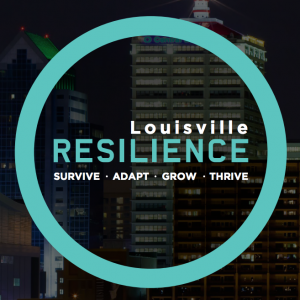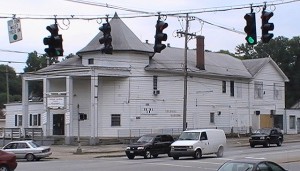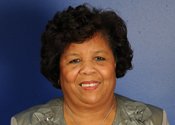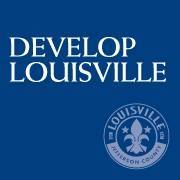 Louisville Metro Animal Services is encouraging pet owners to take advantage of an upcoming Low-Cost Rabies Vaccination Clinic on Saturday, November 10th from 9am-12pm at Wyandotte Park, 1010 Beecher Street.
Louisville Metro Animal Services is encouraging pet owners to take advantage of an upcoming Low-Cost Rabies Vaccination Clinic on Saturday, November 10th from 9am-12pm at Wyandotte Park, 1010 Beecher Street.
In addition to one ($10) and three-year ($15) Rabies vaccinations, LMAS will offer microchipping services for cats and dogs for just $25. So far in 2018, more than one-thousand pets in Jefferson County have been reunited with their owners. But sadly, the majority of cats and dog that entered the LMAS Shelter was not microchipped and could not return home.
“Microchipping is a crucial component to remaining a No-Kill shelter and saving more animal lives,” said Teeya Barnes, spokeswoman for Louisville Metro Animal Services. “Microchipping helps us quickly reunite missing pets and their owners. That means more open kennels for the city’s truly homeless animals. When the shelter is out of space, lives are placed in jeopardy.”
A pet license for cats, dogs or ferrets is required by Law for Jefferson County pet owners, and can be purchased or renewed during the Low-Cost Rabies Vaccination Clinic. A one-year pet license for an altered cat or dog is $10; a three-year, altered pet license is $27. LMAS also offers discounted licensing rates for senior pets: $5 (1-year altered) or $10 (3-year altered).
“A pet license is assurance your pet’s Rabies vaccination is up-to-date, so if they become lost they won’t receive the vaccine unecesssarily if they were to enter the shelter,” said Barnes. “Another benefit is if your pet is lost and picked up by an animal control officer, we can bring them home instead of to the shelter. Your pet won’t be exposed to germs and illnesses commonly found in animal shelters.
The Low-Cost Rabies Clinic is open to all pet owners. Dog must be on-leash and cats must be in carriers during the clinic.
 The work of more than 600 retired and senior volunteers in the Louisville area will be honored at a special event on Wed., Nov. 7. The Louisville Metro Retired and Senior Volunteer Program (RSVP) annual recognition event will take place at Churchill Downs’ Millionaire’s Row (6th Floor), 700 Central Ave. from 11:30 a.m. – 2:30 p.m. The theme is “Everyone’s a Millionaire with RSVP.”
The work of more than 600 retired and senior volunteers in the Louisville area will be honored at a special event on Wed., Nov. 7. The Louisville Metro Retired and Senior Volunteer Program (RSVP) annual recognition event will take place at Churchill Downs’ Millionaire’s Row (6th Floor), 700 Central Ave. from 11:30 a.m. – 2:30 p.m. The theme is “Everyone’s a Millionaire with RSVP.”
As part of the city’s Office of Resilience and Community Services, RSVP connects persons age 55 and over with their choice of some 60 public service and non-profit locations, including American Red Cross, Senior Nutrition Centers, Dare to Care, Community Ministries and the Robley Rex VA Medical Center.
RSVP members will be joined by volunteer site representatives, Senior Corps Advisory Council members and RCS staff. Mayor Greg Fischer will serve as the keynote speaker followed by congratulatory remarks from Gena Redmon-Harris, director of Resilience and Community Services.
“Through their volunteerism these senior citizens are making a real and positive difference in their communities,” said Mayor Fischer. “I am proud to join with the Louisville Metro Retired and Senior Volunteer Program to recognize those who give their time to better the lives of others.”
The Rev. Ron Loughry, Executive Director of Fern Creek/Highview United Ministries, and winner of the 2015 ElderServe’s “Champion for Aging” is serving as the master of ceremonies for the third year in a row. He will also be recognized for his years of service to RSVP and the community as a whole as he will be retiring at the end of this year.
During this year’s celebration, 41 RSVP volunteers who reached their dedicated, volunteer service milestones of five to 30 years will receive special recognition. Also featured will be a VA Salute and Recognition to acknowledge all veterans who serve as RSVPs. One special honoree, Guy Dorsey, a World War II veteran, is being recognized for 25 years of volunteerism in the community and has some 30 family members from all over the United States coming to be with him for the event. In addition, following the buffet meal and speaker presentations, the volunteers will enjoy full access to Churchill Downs and a day at the races.
“RSVP volunteers generously give their energy, skills and caring dedication toward providing over 75,000 hours annually resulting in more than $1.5 million in savings/service impact for their agencies. This celebration is their public ‘thank you’. Everyone is a millionaire with RSVP.” said RSVP Program Coordinator, Christopher Clements.
RSVP is federally sponsored by the Corporation for National and Community Service (CNCS), and this year’s event sponsors include Passport Health Plan, ResCare, and AARP.
For more information on RSVP activities or to learn how to become a volunteer, call (502) 574-1530 or visit https://louisvilleky.gov/government/resilience-and-community-services/retired-and-senior-volunteer-program-rsvp.

photo: Stevietheman
Mayor Greg Fischer joined south and southwest Metro Council members, and representatives from Underhill Associates and the Southwest Dream Team to celebrate the ongoing progress of the $5 million redevelopment of historic Colonial Gardens, and to highlight the work being done to create a safer pedestrian crossing, additional parking, and the addition of a new TARC bus stop next to the project.
“Colonial Gardens is a great investment that connects our city’s past with our future,” said the mayor. “We want to make the new Colonial Gardens as popular as it once was, and for that to happen, we know we need to make it accessible for all our residents. The improvements made along this corridor will benefit not only Colonial Gardens, but other area businesses, residents, and visitors to Iroquois Park.”
Metro Public Works recently completed $200,000 in roadway improvements at the intersection of New Cut Road and W Kenwood Drive where Colonial Gardens is located. The improvements include a left turn lane into Colonial Gardens from New Cut Road, curb extensions, enhanced sidewalks, and on-street parking.
Additionally, paving along Kenwood Avenue is expected to be complete this fall. With the enhanced pedestrian safety features in place, Public Works will monitor the New Cut Road/Kenwood Avenue intersection to optimize the signal for traffic flow in and out of Iroquois Park.
Construction on the $5 million redevelopment of Colonial Gardens started last fall and includes renovating the 7,000 square-foot historic structure, as well as adding three new, one-story buildings for a total of 18,000 square feet. The buildings will share a common patio and garden area. The project is scheduled for completion in the summer of 2019.
The site’s developer, Underhill Associates, is in talks with local restaurant groups to occupy the four corner spaces of the building. “Underhill Associates is proud to bring Colonial Gardens back to life. This is a vital corner for the South End which will be an example of new vitality and will be a catalyst for more redevelopment,” Jeff Underhill said.
Metro Councilwoman Marianne Butler, whose District 15 includes Colonial Gardens, said “We have waited for many years for this revitalization. We are getting a vibrant community magnet complimenting the park while offering neighbors new dining opportunities. It is a win for everyone and I encourage neighbors to patronize the restaurants for many years to come.”
Councilman Blackwell of nearby District 12 said “This project is transforming the New Cut/ Kenwood corner and I am excited to see the changes occurring each day. The infrastructure improvements create a safer pedestrian experience for all, including those who want to enjoy events at Iroquois Park.”
District 25 Councilman Dave Yates said, “It is exciting to see the investment and progress we are making in South Louisville. Through this public-private partnership with the Underhills, the Kenwood and New Cut block is seeing unprecedented rejuvenation that will encourage people across the city to want to travel to our neck of the woods. Soon we will be proud to call Colonial Gardens the gateway to the South End and its success will reverberate southbound along New Cut and Dixie.”
And Vicki Aubrey Welch, noting that she is soon to retire as District 13 Councilwoman, said “It gives me great pride to know I was part of history in bringing Colonial Gardens back to a vibrant historical venue for the heart of South Louisville. Mayor Fischer worked long and hard together with the South End Council to bring this development forward. For that I will be forever grateful.”

Photo: Kentucky Cabinet For Economic Development
Louisville Mayor Greg Fischer today joined community leaders, investors and Louisville Metro Government representatives to champion Opportunity Zones as a new tool to help revitalize Louisville neighborhoods. Additionally, the Mayor released the city’s Opportunity Zones Prospectus, a holistic document that showcases Louisville’s assets and will be shared with investors locally and across the country.
“Opportunity Zones are a new avenue for us to attract investment to areas of our city that already have momentum and could see tremendous growth and opportunity with additional capital investment,” said the Mayor. “We want responsible development and projects that benefit our residents by providing investment without displacement, which is why we’re working closely with community stakeholders, state, and federal government partners to ensure we are best positioned to put private dollars to work.”
Opportunity Zones are a new community development program established by Congress in the Tax Cuts and Jobs Act of 2017. This program encourages long-term investment in low-income urban and rural communities nationwide by providing a tax incentive for investors to re-invest their unrealized capital gains into Opportunity Funds that are dedicated to investing in Opportunity Zones. In Louisville, 19 census tracts are designated as Opportunity Zones.
Transformation is currently underway in the city’s Opportunity Zones. One of the first Louisville investors to take advantage of the recently enacted Opportunity Zone legislation is The Marian Group through its spin-off and expansion of Blacksmith Iron Works, a fabrication and custom metal solutions business that recently moved into a 20,000 square-foot facility at 3100 Vermont Ave. in the Russell neighborhood. The Blacksmith Iron Works expansion will represent almost $750,000 of total investment in Russell and will include at least 16 employees by 2019.
“We are excited about this expansion for Blacksmith Iron Works and to be moving to Russell,” said Jake Brown, President of Blacksmith Iron Works and a Principal with Louisville-based developer, The Marian Group. “To be one of the first Opportunity Zone investments in Louisville just makes it better.”
Additional community partners that are investing in Opportunity Zones include OneWest, a nonprofit community development organization that recently purchased its first property on 18th Street with plans to redevelop it as a restaurant or retail space, and the Louisville Urban League with its $35 million Track on Ali project.
The team at Louisville Forward, the city’s community and economic development agency, is ready to work with businesses and investors to maximize Louisville’s potential for its Opportunity Zones by providing concierge project management, offering incentives for projects in CDBG-eligible census tracts, and working to accelerate the permitting process.
The city is also working to identify the needs of investors, developers and business owners, and then connect them with each other dependent on resources that will support each project. To be listed in the city’s database, complete the form found at https://louisvilleky.wufoo.com/forms/kzd6v3x13ol8kc/
To assist business owners and investors with identifying Opportunity Zones, the city created an interactive map to show exact addresses and boundaries of Louisville’s designated Opportunity Zones. To search Louisville-specific addresses, visit https://louisvilleky.gov/government/louisville-forward/opportunity-zones-louisville

Photo: Louisville Metro Council
On Sunday, November 4th, Councilwoman Barbara Shanklin (D-2) will join family and friends of the late Frank W. Weaver for the dedication of an honorary sign at the corner of St. Francis Street and Broadmoor Boulevard.
“Frank Weaver was a true American. He was one of the last of the famed Tuskegee Airman who came home to his native Louisville to start a family after his service to our country,” says Shanklin. “He was a dedicated husband, father and grandfather who provided for his family and was an important part of our community.”
At 3:00pm on Sunday, Shanklin will officially unveil a “Frank Weaver Way” honorary street sign. The designation was approved by the Metro Council on September 27th.
Mr. Weaver was born on December 28, 1926 in Louisville, and died on August 18, of this year at the age of 91.
At 18 years of age he was drafted into the United States Armed Forces, and after basic training was assigned to the Tuskegee Army Air Field in Tuskegee, Alabama. In1939, training of African American pilots began and by 1941 during World War II, the first African American U.S. military pilots were trained at the Tuskegee Army Air field and Tuskegee University.
Mr. Weaver was as one of the famed Tuskegee Airman and served our nation during World War II as Hanger Chief and a B-25 engine mechanic.
After the war, Mr. Weaver came home to Louisville and worked first for the Jeffersonville Quartermaster Depot, and later worked for General Electric where he retired after 32 years. He also owned a neighborhood gas station where he put his mechanical skills to work repairing automobile engines;
He was a deacon at First Baptist Church of Jeffersontown, a volunteer in the political arena, and a member of the Brigadier General Noel F. Parrish Chapter of Tuskegee Airmen, Inc. in Kentucky.
Mr. Weaver was married to the late Jewel D. Titus for 58 years.
They have two children (Gary L. Weaver, Sr. and Andre’ M. Weaver), six grandchildren, and seven great grandchildren.
The Ceremony will take place at the corner of St. Francis Street and Broadmoor Boulevard.
 Mayor Fischer has announced today that Develop Louisville’s Office of Advanced Planning will issue a Request For Proposal to create a master plan for Broadway between Shawnee Park and Baxter Avenue. The city is seeking proposals that will transform the corridor, as envisioned by Move Louisville, from its existing auto-centric form into a multi-modal “complete street” designed to enable safe, convenient, and efficient access with a focus on premium transit that will serve as a catalyst for economic development.
Mayor Fischer has announced today that Develop Louisville’s Office of Advanced Planning will issue a Request For Proposal to create a master plan for Broadway between Shawnee Park and Baxter Avenue. The city is seeking proposals that will transform the corridor, as envisioned by Move Louisville, from its existing auto-centric form into a multi-modal “complete street” designed to enable safe, convenient, and efficient access with a focus on premium transit that will serve as a catalyst for economic development.
Move Louisville, the city’s long-range transportation plan, identifies Broadway as one of its 16 priority projects and recommends a complete street retrofit of the corridor. The entire length of Broadway (about six miles) from Shawnee Park to Baxter Avenue will be studied. The objectives for the Broadway master plan are to build upon the five guiding CHASE principles (Connected, Healthy, Authentic, Sustainable, Equitable) established as the framework for Plan 2040, the city’s comprehensive plan.
“From end to end, Broadway is diverse in people, culture, business and landscape. A ride starting at Shawnee Park and ending at Cave Hill Cemetery will offer anyone a remarkable look at Louisville’s diverse neighborhoods,” said Mayor Greg Fischer. “That ride though should be safer for people in cars, in buses, on a bicycle or on foot. The corridor is too car focused and has some of the city’s most dangerous intersections for car and pedestrian crashes. Broadway has tremendous potential for revitalization and economic development. My team envisions a Broadway – the same road Muhammad Ali was paraded down as champion and as icon – that is safer, more vibrant, and full of life along every neighborhood that touches it.”
“Broadway has a large footprint and a long history,” said District 4 Councilwoman Barbara Sexton Smith. “Everyone should feel safe on Broadway from Shawnee Park to the Highlands. I look forward to working together to build a better Broadway, one that is safer, more connected and open for economic development from end to end. Together we can do this.”
What we know today as Broadway was constructed in 1832 and was then named Dunkirk Road. By 1879, the road was 120-feet wide and stretched from the Ohio River to Baxter Avenue. The creation of Shawnee Park has since shortened the road in length. Over the next several decades, a boom in downtown made Broadway a focal point of the central business district. A streetcar line served the entire corridor from 1940 until 1966. It has long served as one of Louisville’s most iconic roadways, connecting Louisville’s eastern and western urban neighborhoods.
Over the past several decades, Broadway has evolved into an auto-centric corridor that is littered with surface parking lots and an under-performing built environment. The current roadway design prioritizes automobiles, promotes high vehicular travel speeds, and has led to unsafe conditions for all users, such as the high pedestrian crash rates near Jefferson Community Technical College and along the western parts of the corridor.
Broadway also provides critical transit access for the Transit Authority of River City (TARC). The #4, #18, and #23 TARC bus routes all offer frequent service along Broadway and give key connections to provide links to other routes for transfers. These three routes account for more than 5 million trips per year, which is about 40 percent of TARC’s ridership.
Despite its current insufficiencies, Broadway is beginning to show signs of revitalization. Numerous planning efforts and development projects that will directly impact the area are completed or are underway, and amplify the need to holistically plan for the corridor. These projects include two multifamily apartment complexes between Barret and Baxter avenues, the Paristown arts and entertainment district, Reimagine 9th Street, Dixie Highway Bus Rapid Transit, the 18th Street realignment, the Republic Bank Foundation YMCA, and the Passport Health Plan campus.
A consultant for the master plan will be selected in early 2019 and community engagement – which will occur in many forms and will involve residents, organizations and venues throughout the entire corridor – will take place through spring and summer 2019. A draft plan is expected to be available for public review in fall 2019, and a final document should be complete in spring 2020.
 Mayor Fischer announced today that Develop Louisville’s Office of Advanced Planning has issued a Request For Proposal for the creation of a new Smoketown neighborhood plan. This neighborhood plan is expected to be complete by the end 2019 and is an update to the current Smoketown/Shelby Park Neighborhood Plan, which was adopted in 2002.
Mayor Fischer announced today that Develop Louisville’s Office of Advanced Planning has issued a Request For Proposal for the creation of a new Smoketown neighborhood plan. This neighborhood plan is expected to be complete by the end 2019 and is an update to the current Smoketown/Shelby Park Neighborhood Plan, which was adopted in 2002.
A neighborhood plan offers the community an opportunity to be proactive, to establish neighborhood goals, and to coordinate with public and private investment. Residents and businesses will be engaged throughout the process and are directly involved in creating the plan. The planning process allows a neighborhood to build shared values, goals, and objectives for the future of Smoketown. Staff will work with neighbors to emphasize the CHASE principles—connected, healthy, authentic, sustainable, and equitable.
“Louisville’s renaissance is spread across our city, particularly in our edge neighborhoods like Butchertown, Portland, Russell, and Smoketown, to name a few,” Mayor Greg Fischer said. “Neighborhood plans are a key for implementing the community’s vision. Updating the vision for the Smoketown neighborhood is critical to set a course for the neighborhood that embraces its history and prepares for future growth that includes current Smoketown residents and businesses.”
“Smoketown is a neighborhood filled with excited neighbors that I know are looking forward to making plans for the future of their neighborhood,” said District 4 Councilwoman Barbara Sexton Smith. “This process will allow the neighborhood to have a voice and a unified vision moving forward for future public and private investment in Smoketown.”
The Smoketown neighborhood, located southeast of downtown, is bordered by Broadway, South Floyd Street, East Kentucky Street, and Beargrass Creek. With much recent and upcoming public and private investment in the surrounding neighborhoods, this is an appropriate time to connect with residents and discuss the future of their neighborhood. Once the neighborhood plan is complete and adopted by Metro Council, it will be used as a guiding document for future public and private investment.
Community engagement will begin in 2019. The neighborhood plan is expected to be complete by the end of 2019.
 Weather
Weather Traffic
Traffic @LouisvilleDispatch
@LouisvilleDispatch @LouisvilleDisp
@LouisvilleDisp Subscribe
Subscribe